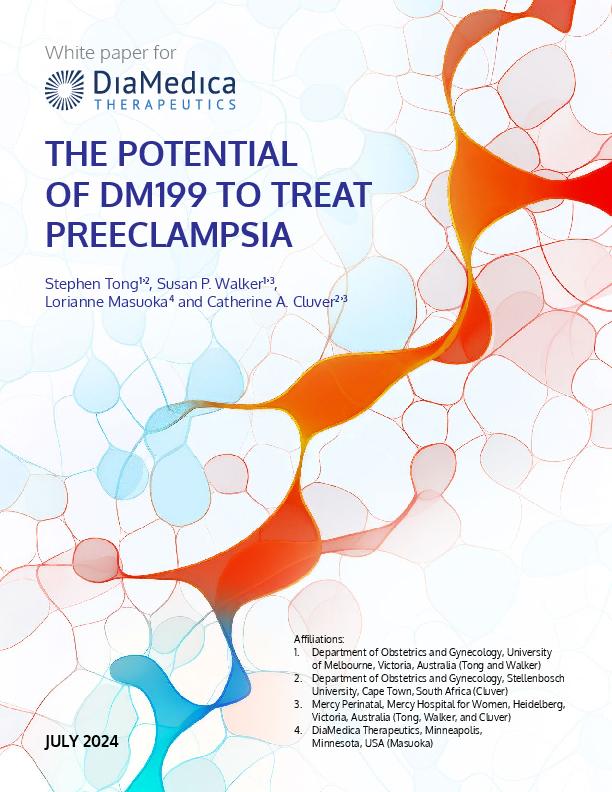The Unmet Need in Preeclampsia and Fetal Growth Restriction: Preeclampsia is one of the leading causes of maternal mortality worldwide1, affecting an estimated 5-8% of all pregnancies in the United States and approximately 10 million women globally. Each year, preeclamspsia and related hypertensive disorders contribute to the deaths of about 76,000 pregnant women and 500,000 infants worldwide.2 Research indicates that over 90% of these fatalities occur in low- and middle-income nations, underscoring the disproportionate impact of preeclampsia on minority communities.3

Currently, there are no FDA-approved treatment options to slow the disease progression of preeclampsia. In the absence of a standardized treatment, care typically involves close monitoring of the mother and, if serious complications develop, early delivery of the baby – regardless of gestational age. Medications like angiotensin converting enzyme inhibitors (ACEi) and angiotensin receptor blockers (ARBs) are contraindicated in preeclampsia because they have a small molecular size and can cross the placental barrier and negatively impact fetal development. A treatment that safely manages blood pressure and protects against vascular damage would represent a major and potentially life-saving breakthrough.
Fetal growth restriction (FGR), which often occurs alongside preeclampsia, represents another major unmet medical need. Affecting an estimated 8–10% of pregnancies worldwide⁴, FGR is a leading cause of stillbirth and long-term health complications for surviving infants, including chronic cardiovascular and metabolic disorders later in life⁵. In the United States, roughly 120,000 pregnancies are impacted annually⁶, yet there are no approved therapies that can improve blood flow to the placenta or restore normal fetal growth. Current management is limited to increased monitoring and, when fetal distress worsens, preterm delivery. A treatment that could safely enhance placental perfusion and promote fetal growth without compromising maternal health would transform outcomes for both mother and baby, addressing one of the most pressing gaps in maternal-fetal medicine.
1. Force UPST. Screening for Preeclampsia: US Preventive Services Task Force Recommendation Statement. JAMA 2017; 317(16): 1661-7.
2. Preeclampsia Foundation - preeclampsia and maternal mortality: A global burden. Preeclampsia Foundation - Saving mothers and babies from preeclampsia.
3. Say L, Chou D, Gemmill A, et al. Global causes of maternal death: a WHO systematic analysis. Lancet Glob Health 2014; 2(6): e323-33.
4. Gordijn, S. J., et al. “Consensus Definition of Fetal Growth Restriction: A Delphi Procedure.” Ultrasound in Obstetrics & Gynecology. 2016;48(3):333–339.
5. Malhotra, A., et al. “Long-Term Health Outcomes in Infants with Fetal Growth Restriction.” The Lancet Child & Adolescent Health. 2019;3(10):647–656.
6. Centers for Disease Control and Prevention (CDC). Reproductive Health: Fetal Growth Restriction. Accessed 2025.
Phase 2 Investigator-Sponsored Trial Design
[Enrollment in Part 2 & Part 3 starting Q4 2025]
Part 1: Planned delivery within 72 hours. This open-label, ascending dose finding study recruited acutely hypertensive women diagnosed with preeclampsia (PE) and gave birth within 72 hours. The DM199 dose gradually increased in 10 cohorts of three patients each, starting with an intravenous loading dose, followed by subcutaneous administration. DiaMedica reported positive results from Part 1a of its Phase 2 trial in July 2025, showcasing statistically significant reductions in blood pressure and dilation of intrauterine arteries. Additionally, DM199 did not cross the placental barrier, representing a significant potential safety advantage over other therapies in development.
Part 2: Expectant management. This open-label study will evaluate safety, tolerability, and efficacy of DM199 in women with early onset PE (gestational age of 27+0 to 32+6) who are candidates for expectant management or prolongation of pregnancy. Thirty women will be enrolled for this study and will receive an initial IV/SC dose on Day 1 followed by repeated SC doses until delivery.
Part 3: Fetal growth restriction (FGR). This open-label study will evaluate safety, tolerability and efficacy of DM199 in women with early onset FGR (gestational age 27+0 to 32+6), defined as fetal growth <3rd percentile, who do not have preeclampsia. Thirty women will be enrolled in this study and will receive an initial dose on Day 1 followed by repeated SC doses until delivery.
A comprehensive set of outcome data will be collected from this trial. While the primary focus is on safety, additional measures will include changes in blood pressure and other indicators that may provide early signals of efficacy. Each sub-cohort will have tailored inclusion and exclusion criteria, as well as slightly different outcome measures to reflect their distinct clinical profiles. Throughout Part 2 of the study, participants will be closely monitored by a member of the research team, with treatment continuing until delivery. Post-delivery, participants will be followed for up to six weeks to ensure close monitoring of their recovery and to gather important postnatal safety data.
View Part 1a Interim ResultsDM199 for Pregnancy Complications Trial Collaborators
This study is being conducted at Tygerberg Hospital in Cape Town, South Africa, under the leadership of Professor Catherine Cluver, MD, Ph.D., Professor of Maternal-Fetal Medicine at Stellenbosch University, in collaboration with DiaMedica. This team is uniquely distinguished as the only group worldwide to have successfully conducted successive clinical trials evaluating novel therapeutics for the treatment of preeclampsia, positioning them as recognized leaders in the field.

